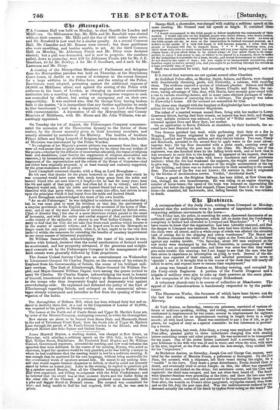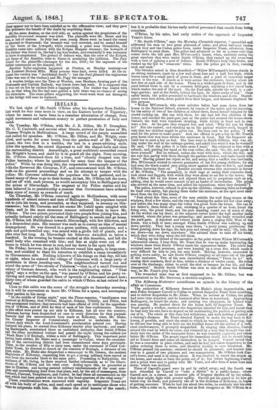gbe larobincts.
A correspondent of the Daily News, writing from Liverpool on Monday, declared that the authorities were in possession of important information respecting seditious movements in the town- " Oa Friday last, the police, in searching for arms, discovered documents of an authentic and very- alarming character, which left no doubt that the Confederate
conspiracy in Ireland had extended to Live land Manchester." * * * "I have reason to know that the organization been tolerably matured, and that the danger to Liverpool was imminent. The town had been divided into districts, the clubs were all armed, and to a whole corps of rebels was allotted the atrocious task of setting fire to the shipping and cotton warehouses." The Mayor and Mr. Rushton remained the whole of Friday night at the Town-hall, in readiness against any sudden trouble. "On Saturday, about 300 men employed at the new docks were discharged by the Dock Committee, in consequence of their refusing to act as special constables; and there was some fear that they woald give some trouble this morning: but I am happy to see that the men who had' been sworn in experience no interruption on going to work. Several of the dis- missed men repented of their conduct, and solicited permission to serve. as 'specials'; and it is thought that in the course of the week they will nearly all' solicit to serve, and request leave to resume their employment."
A camp was formed at Everton on Monday evening, and occupied by the Forty-sixth Regiment. A portion of the Fourth Dragoons and a brigade of artillery were also to take up their quarters at the same place. A few companies of the Eighty-first occupy Birkenhead.
A voluntary church-rate is in course of collection at Manchester. The appeal of the Churchwardens is handsomely responded to by the parish- ioners.
The Blaenavon Works, the furnaces of which have been blown out for the last few weeks, commenced work on Monday sennight.—Bristol Mercury.
At York Assizes, on Saturday, twenty-six prisoners, convicted of various of- fences of seditious speaking, drilling, and rioting, received sentence: three were condemned to imprisonment for two years; several to imprisonment for eighteen months; and others for an imprisonment varying in length down to a single month; all with hard labour. Bland was sentenced to pay a fine of 101., or go to prison, for neglect of duty as a special constable: he was lukewarm in prevent- ing a rescue.
At Derby Assizes, last week, John Gray, a young man employed in the Derby Post-office, pleaded guilty to three indictments charging him with stealing letters containing money and other property. He was sentenced to be transported for ten years. One of the stolen letters contained half a sovereign, sent by a poor Irishman to his wife who was ill and in want; and when the man, with tears in his eyes, inquired at the Post-office about the non-receipt, Gray scolded him for his "impudence."
At Maidstone Assizes, on Saturday, Joseph Coe and George Coe, seamen, were tried for the murder of Maurice Evans, a policeman at Ramsgate. On the 2151 June, the accused, with a shipmate, left their vessel during the night, for a "ramble " in the town. They made a great disturbance; Evans desired them to desist, and eventually tried to arrest Joseph: on this, the officer was repeatedly knocked down and kicked on the shins; but assistance came, and the Coes were captured: the third man escaped, and has not since been heard of. The Sand- wich Quarter-Sessions were proceeding at the time; and there the two men were tried for the assault, convicted, and sentenced to be imprisoned for three months. Soon after, the wounds on Evans's shins gangrened, erysipelas ensued, then fever, and on the 9th Jnly the poor man died. Was the maletreatment endured by the deceased actually the cause of his death by typhus fever acting on the brain? The
Jury appear not to have been satisfied as to the affirmative view; and they gave the pnsoners the benefit of the doubt by acquitting them.
At the same Assizes, on the civil side, an action against the proprietors of the Satellite Gravesend steamer was tried. The plaintiffs were Mr. Moore and his eon, a lad of sixteen. In July last year, young Moore went on board the vessel to proceed to Gravesend; the steamer was very crowded, and he seated himself on the beam of the bowsprit; while rounding a point near Greenhithe, the Satellite came into collision with the Eclipse Margate steamer; the bowsprit of the former was forced in, the boy's leg was broken, and eventually it was necessary to have it amputated. The ground of defence was, that the crew of the Eclipse, not those of the Satellite, were to blame in producing the (collision. The Jury found for the plaintiffs—damages for the son, 2001.; for the expenses of the father consequent on the disaster, 901. Another boiler-explosion happened at Preston, on Monday morning—at the Lambert Bottom Mills. Many persons were hart, seven killed. At the in- nest the verdict was " Accidental death "; but the Jury ',gamed the engineman (who was one of the victims) and Mr. Fogg the manager. A wooden bridge over the Tyne at Warden, near Hexham, forming part of the Newcastle and Carlisle Railway, was burnt down last week. It is supposed that it was set on fire by cinders from a luggage-train. The timber was coated with tar, so that when the fire had once gained a hold there was no chance of saving the structure. The stone pillars supporting the wood-work were not damaged; so the bridge will soon be replaced.



















 Previous page
Previous page